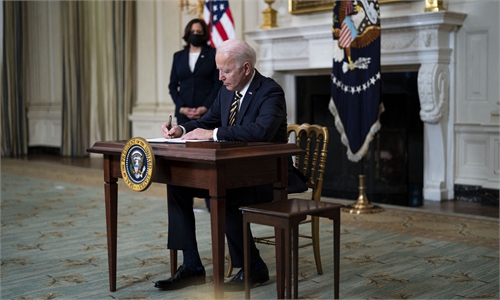COMMENTS / EXPERT ASSESSMENT
Quad economic ties not solid enough to tie India on chariot of ‘Asian Nato’

Illustration: Tang Tengfei/GT
The White House has announced that US President Joe Biden will meet virtually with leaders from Japan, Australia and India in the Quad framework on Friday. This will be the first-ever meeting between the heads of state of the four-member Quad group, demonstrating Biden's intention to strengthen and consolidate the framework during his tenure.
Unlike his predecessor only stressing Quad's cooperation in security and military fields, Biden seems intent on expanding cooperation with its "allies and partners" in the Indo-Pacific to a wider range. The White House said COVID-19, economic cooperation, and the climate change crisis will also be topics of the upcoming discussion.
A senior US administration official was reportedly to reveal the Friday summit plans to announce financing agreements to support an increase in manufacturing capacity for coronavirus vaccines in India.
While the significance and necessity to conduct international vaccine cooperation to global post-pandemic recovery are needless to say, Quad's latest commitment to India's vaccine industry does remind people of the so-called Supply Chain Resilience Initiative (SCRI) - Japan, Australia and India's joint efforts to exclude China from industrial cooperation.
While it's not a formal military alliance like NATO, the Quad has been increasingly viewed as an open anti-China bloc. In an article published in last July, US think tank the Rand Corporation said that despite not openly identifying China as the primary target, Quad signals unified resolve among the four nations to counter China's economic rise.
If Quad's latest financial support plan for India's vaccine industry aims to solve the global vaccine supply shortage and division inequality, the efforts are bound to be welcomed by countries across the globe, including China.
However, if the Quad's move is driven by hidden political agenda of wooing India - a traditional un-aligned nation that holding balance stance between the US and China - to dent China's economic strength, the calculation is doomed to fail.
As a major pharmaceutical hub, India is home to a massive vaccine industry, but this doesn't necessarily mean the South Asian country could boost its vaccine capacity solely with financial supports from other Quad countries. Without active pharmaceutical ingredients (API) and semi-finished products imported from China, India may face more challenges to fill the gap.
Even with heightened tensions with China over border issues and following rampant anti-China sentiments in India, the bilateral trade between the two countries remained stable in 2020.
China overtook the US, regain the position as India's top trading partner last year despite the Indian government's arbitrary obstruction measures and discriminate policies against Chinese investments. This already proved that the two major Asian economies had developed an intertwined economic tie, and it's impossible to cut the ties with political calculation.
However, a closer look at India's trade data shows that India's economic and trade ties with other Quad countries are far from solid. Even as New Delhi had largely tilted to the US in 2020, trade data showed that China is the biggest source of Indian import, with a trading value more than the total of the US and United Arab Emirates (UAE) - the second and third largest source of Indian imports.
Given India's subtle political stance between China and the US, it's not hard to imagine the South Asia country may not rush to embrace the Quad, if the framework is solely based on military and security cooperation.
New Delhi would not want to be tied to the chariot of "Asian Nato," because it will cost New Delhi's diplomatic maneuver spaces. The US' attempt to expand Quad cooperation to a wider range is to reassure India while meeting its economic demands, but as long as it's against economic principles and rules it will inevitably fail.
The author is director of the research department of the National Strategy Institute at Tsinghua University. bizopinion@globaltimes.com.cn



